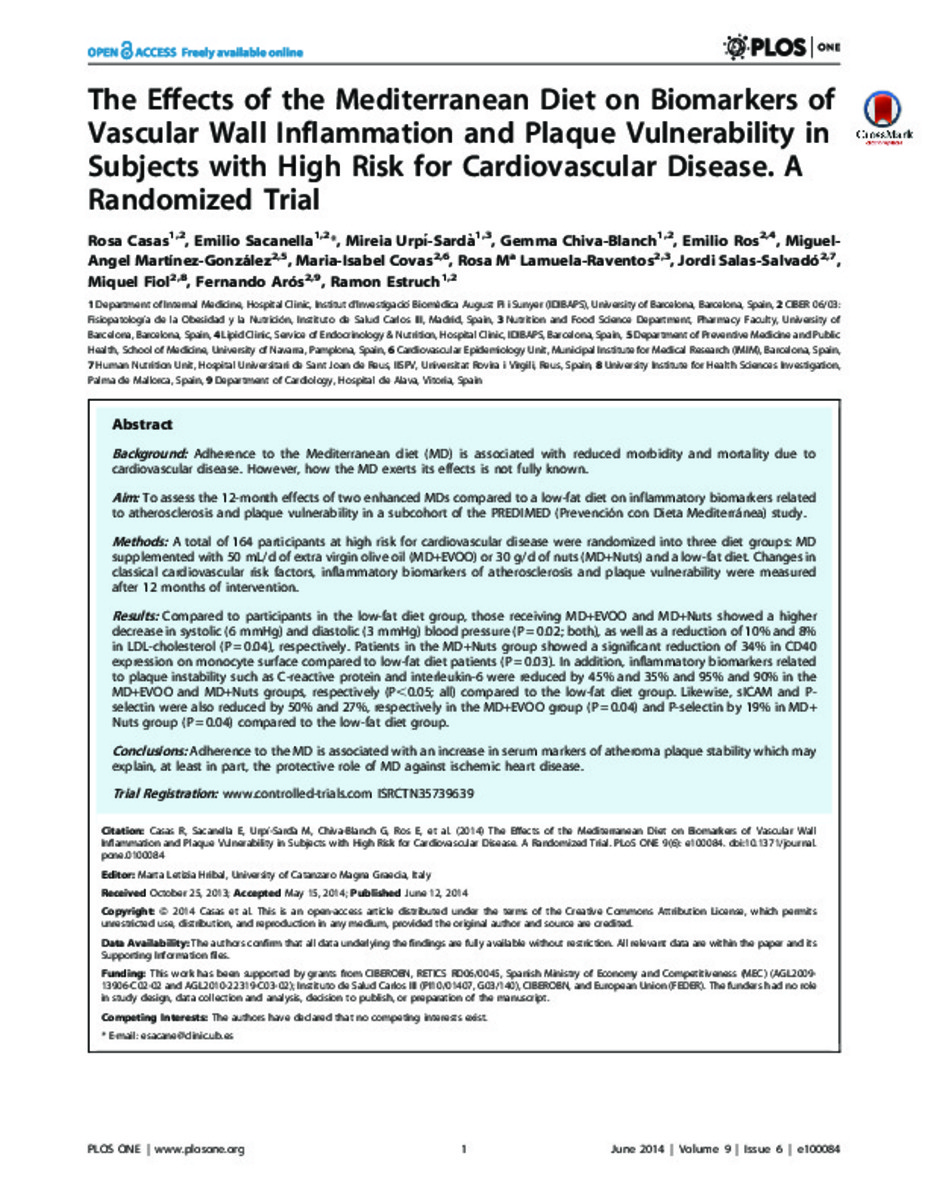Full metadata record
| DC Field | Value | Language |
|---|---|---|
| dc.creator | Casas, R. (Rosa) | - |
| dc.creator | Sacanella, E. (Emilio) | - |
| dc.creator | Urpi-Sarda, M. (Mireia) | - |
| dc.creator | Chiva-Blanch, G. (Gemma) | - |
| dc.creator | Ros, E. (Emilio) | - |
| dc.creator | Martinez-Gonzalez, M.A. (Miguel Ángel) | - |
| dc.creator | Covas, M.I. (María Isabel) | - |
| dc.creator | Lamuela-Raventos, R.M. (Rosa Maria) | - |
| dc.creator | Salas-Salvado, J. (Jordi) | - |
| dc.creator | Fiol, M. (Miquel) | - |
| dc.creator | Aros, F. (Fernando) | - |
| dc.creator | Estruch, R. (Ramón) | - |
| dc.date.accessioned | 2014-11-15T19:00:27Z | - |
| dc.date.available | 2014-11-15T19:00:27Z | - |
| dc.date.issued | 2014 | - |
| dc.identifier.citation | Casas R, Sacanella E, Urpí-Sardá M, Chiva-Blanch G, Ros E, Martínez-González MA, et al. The effects of the mediterranean diet on biomarkers of vascular wall inflammation and plaque vulnerability in subjects with high risk for cardiovascular disease. A randomized trial. PLoS One. 2014 Jun 12;9(6):e100084 | es_ES |
| dc.identifier.issn | 1932-6203 | - |
| dc.identifier.uri | https://hdl.handle.net/10171/37048 | - |
| dc.description.abstract | Background: Adherence to the Mediterranean diet (MD) is associated with reduced morbidity and mortality due to cardiovascular disease. However, how the MD exerts its effects is not fully known. Aim: To assess the 12-month effects of two enhanced MDs compared to a low-fat diet on inflammatory biomarkers related to atherosclerosis and plaque vulnerability in a subcohort of the PREDIMED (Prevencio´n con Dieta Mediterra´nea) study. Methods: A total of 164 participants at high risk for cardiovascular disease were randomized into three diet groups: MD supplemented with 50 mL/d of extra virgin olive oil (MD+EVOO) or 30 g/d of nuts (MD+Nuts) and a low-fat diet. Changes in classical cardiovascular risk factors, inflammatory biomarkers of atherosclerosis and plaque vulnerability were measured after 12 months of intervention. Results: Compared to participants in the low-fat diet group, those receiving MD+EVOO and MD+Nuts showed a higher decrease in systolic (6 mmHg) and diastolic (3 mmHg) blood pressure (P = 0.02; both), as well as a reduction of 10% and 8% in LDL-cholesterol (P = 0.04), respectively. Patients in the MD+Nuts group showed a significant reduction of 34% in CD40 expression on monocyte surface compared to low-fat diet patients (P = 0.03). In addition, inflammatory biomarkers related to plaque instability such as C-reactive protein and interleukin-6 were reduced by 45% and 35% and 95% and 90% in the MD+EVOO and MD+Nuts groups, respectively (P,0.05; all) compared to the low-fat diet group. Likewise, sICAM and Pselectin were also reduced by 50% and 27%, respectively in the MD+EVOO group (P = 0.04) and P-selectin by 19% in MD+ Nuts group (P = 0.04) compared to the low-fat diet group. Conclusions: Adherence to the MD is associated with an increase in serum markers of atheroma plaque stability which may explain, at least in part, the protective role of MD against ischemic heart disease. | es_ES |
| dc.language.iso | eng | es_ES |
| dc.publisher | Public Library of Science | es_ES |
| dc.rights | info:eu-repo/semantics/openAccess | es_ES |
| dc.subject | Mediterranean diet | es_ES |
| dc.subject | Cardiovascular disease | es_ES |
| dc.subject | Atherosclerosis | es_ES |
| dc.subject | Inflammatory biomarkers | es_ES |
| dc.title | The effects of the mediterranean diet on biomarkers of vascular wall inflammation and plaque vulnerability in subjects with high risk for cardiovascular disease. A randomized trial | es_ES |
| dc.type | info:eu-repo/semantics/article | es_ES |
| dc.identifier.doi | http://dx.doi.org/10.1371/journal.pone.0100084 | es_ES |
Files in This Item:
Statistics and impact
Items in Dadun are protected by copyright, with all rights reserved, unless otherwise indicated.






